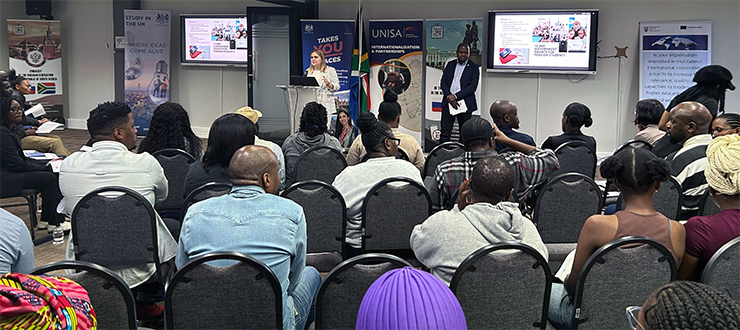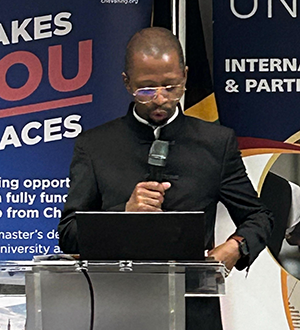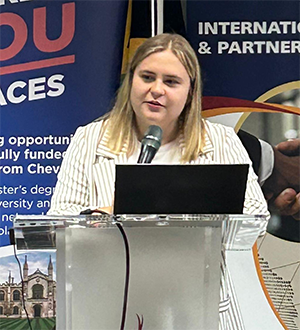News & Events
International scholarships information session offers a pathway to global engagement
On 4 October 2024, Unisa’s Internationalisation and Partnerships Directorate welcomed students and academics to an impactful international scholarships information session held at the Kgorong Building. The session aimed to shed light on the fully funded scholarship opportunities available to students seeking to study abroad, an initiative in partnership with the Department of Higher Education and Training (DHET).

A vibrant gathering of attendees participating in the session
The session was opened by Professor Boitumelo Senokoane, Acting Executive Director of the Department of Institutional Advancement. In his welcoming address, Senokoane underscored the importance of international academic exposure, highlighting how global mobility can significantly enhance students’ personal and professional development.
Access to international education
He emphasised the role of scholarships in bridging the gap between academic aspirations and financial limitations, enabling South African students to access world-class education abroad. He encouraged all eligible students to seize this golden opportunity to further their studies internationally, urging them to consider the long-term value of such experiences in their careers.

Professor Boitumelo Senokoane delivering the welcoming address, setting the tone for a productive session
He continued: “We are entering these partnerships fully awake and aware, with hope and commitment that internationalisation will lead to decolonisation. For us to be decolonised, we must embrace exposure – and exposure requires scholarships.”
Senokoane underscored the life-changing impact of scholarships, emphasising their ability to alter perspectives, broaden access to opportunities, and ultimately transform lives. He drew on his personal experience as a recipient of a scholarship for his master’s degree abroad, illustrating how such opportunities can foster a profound shift in one’s worldview.
“Scholarships,” he said, “change your view, they give access, they change your perception, and they change your life,” encouraging students to consider how these opportunities can reshape their futures.”
In closing, Senokoane proudly noted that Unisa is the number one producer of PhD graduates on the continent and ranks sixth among universities in South Africa, as recognised by Times Higher Education.
Opportunities on offer
The information session highlighted various fully funded opportunities, including postdoctoral, master’s, and bachelor’s programmes, as well as short courses and language training. Representatives from the Russian Embassy discussed Russian scholarship options, while the British High Commission provided insights on the Chevening Scholarship. Additionally, DHET representatives explained international scholarship opportunities. Attendees were guided through the application processes, eligibility criteria, and benefits of these scholarships, ensuring they left with a comprehensive understanding of how to apply.
Russian scholarships
The Russian Embassy offers 100 fully funded scholarships for South African and Lesotho students, covering bachelor’s, master’s, and PhD programmes. The academic year is divided into two semesters, with study durations of four years for a bachelor’s, two years for a master’s, and three years for a PhD. The scholarship includes a monthly allowance (approximately $50), dormitory accommodation (if available), and preparatory language courses for those studying in Russian. Additional support for selected students from the DHET includes a stipend, settlement allowance, and annual travel allowance.

Polina Kulakova from the Russian Embassy engaging with attendees
Eligible applicants include South African citizens who have completed secondary schooling (for Bachelor’s) or have a master’s degree (for PhD). Required documents include academic certificates, a valid passport, and medical certificates after the interview stage. Some programmes are taught in English, but placement in English-taught courses is not guaranteed.
This opportunity offers access to world-class education and exposure to Russian culture and academia.
UK opportunities
The Chevening Scholarship, the United Kingdom (UK) Government’s flagship international programme, offers fully funded opportunities for individuals to pursue a master’s degree at any UK university. It is aimed at open-minded, driven individuals with a vision to create positive change in their home countries.
Eligibility requirements include South African citizenship, an undergraduate degree, at least two years of work experience, and demonstrated leadership potential. The scholarship covers full tuition fees, a living allowance, an economy return flight, and additional grants for essential expenses. For MBA programmes, there is a global cap of £22,000, with any additional costs covered by the student.
Applications for 2024 opened on 6 August and will close on 5 November 2024. Interviews will be held between February and April 2025, with final results announced in June/July 2025. Successful applicants will begin their studies in the UK in September/October 2025. This prestigious programme equips scholars with the education, network, and support needed to influence change in their home countries.
DHET scholarships
The DHET facilitates several international scholarship opportunities, ensuring South African students gain access to global education. Key eligibility criteria include South African citizenship and a 60-65% average in previous studies (bachelor’s, master’s, or PhD).
Notable scholarships include the Chinese Government Scholarship, Stipendium Hungaricum Programme, Mauritius Africa Scholarship, and Russian State Scholarship, among others. The DHET also supports the Erasmus+ Program, which promotes student and staff mobility, international collaboration, and access to world-class resources.
For detailed information and deadlines, visit www.internationalscholarships.dhet.gov.za.
Concerns addressed
The session also included a valuable Q&A segment, where attendees voiced important concerns about studying abroad. One of the main topics was the safety of students, particularly in Russia, given the ongoing conflict between Russia and Ukraine.
Questions were raised about how safe it would be for South African students to study abroad under current conditions. Other concerns included whether the scholarship programmes were fully funded, with queries about what expenses are covered and whether students would need to cover any additional costs. Attendees also asked about the medical requirements for studying abroad, the language barriers and visa application processes.
These scholarships present incredible opportunities for South African students to broaden their academic horizons and gain international exposure.
* By Seyabonga Thipe, Intern Journalist, Department of Institutional Advancement
* * Photography by Godfrey Mahloko, Internationalisation and Partnerships Directorate
Publish date: 2024/10/10
